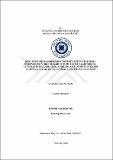DSpace Repository
BEKLENMEDİK BAŞARISIZLIK GÖSTEREN ÜSTÜN YETENEKLİ ÖĞRENCİLERİN OKUL BAŞARI TUTUMLARI İLE AKADEMİK ÖZYETERLİK İNANÇLARI, ALGILADIKLARI AİLE OTORİTE STİLLERİ VE BENLİK SAYGILARI ARASINDAKİ İLİŞKİNİN İNCELENMESİ
JavaScript is disabled for your browser. Some features of this site may not work without it.
| dc.contributor.author | Yılmaz, Saadet
|
|
| dc.date.accessioned | 2019-06-01T11:04:40Z | |
| dc.date.available | 2019-06-01T11:04:40Z | |
| dc.date.issued | 2018 | |
| dc.identifier.uri | http://hdl.handle.net/11547/2403 | |
| dc.description.abstract | Bu çalışmada, beklenmedik başarısızlık kategorisine alınabilecek olan üstün yetenekli öğrencilerin okul başarı tutumları ile akademik öz-yeterlik inançları, algıladıkları aile otorite stilleri ve benlik saygıları arasındaki ilişkinin incelenmesi amaçlanmıştır. Bu araştırmada, İstanbul ilinde öğrenim gören beklenmedik başarısızlık kategorisine alınabilecek olan 122 üstün yetenekli öğrenciye Okul Başarı Tutum Ölçeği-Revize Formu (OBTÖ-R), Rosenberg Benlik Saygısı Ölçeği, Aile Otorite Stil Ölçeği ve Akademik Öz-yeterlik Ölçeği veri toplama aracı olarak kullanılmıştır. Elde edilen verilen istatistiksel analizinde yüzde, frekans, t-Testi, ANOVA, pearson momentler çarpımı gibi istatistiksel hesaplamalar kullanılmıştır. Sonuç olarak beklenmedik başarısızlık kategorisine alınabilecek öğrencilerin okul başarı tutumlarında ve bu ölçeğin öğretmene yönelik tutum ve hedef değeri boyularında cinsiyete göre anlamlı bir farklılaşma olduğu görülmüştür (p<.05). Akademik öz-yeterlik ölçeği puanında cinsiyete göre anlamlı farklılaşma olduğu görülmektedir (p>.05). Okul değişkenine (Devlet ve Özel) göre akademik özyeterliği algısı özyeterlik ölçeği puanlarında ve ölçeğin öğretmene ve okula yönelik tutum ve hedef değeri alt boyutlarında devlet okulu lehine anlamlı farklılaşma olduğu görülmektedir (p<.05). Üstün yetenekli öğrencilerin okul başarı tutumları ile benlik algısı (r=308), akademik öz-yeterlik (r=.531), ihmalkâr aile stili (r=.271), özerk aile stili (r=.342) anlamlı ilişkiler belirlenmiştir. İlerideki araştırmalar üstün yetenekli öğrencilerin beklenmedik düşük başarısızlık olgusuna etki eden faktörlerin nitel olarak araştırılması önerilebilir. | tr_TR |
| dc.language.iso | tr | tr_TR |
| dc.publisher | İSTANBUL AYDIN ÜNİVERSİTESİ SOSYAL BİLİMLER ENSTİTÜSÜ | tr_TR |
| dc.subject | Üstün Yetenekliler | tr_TR |
| dc.subject | Beklenmedik Başarısızlık | tr_TR |
| dc.subject | Benlik Saygısı | tr_TR |
| dc.subject | Okul Başarı Tutumu | tr_TR |
| dc.subject | Aile Otorite Stilleri | tr_TR |
| dc.subject | Akademik Öz-yeterlik | tr_TR |
| dc.title | BEKLENMEDİK BAŞARISIZLIK GÖSTEREN ÜSTÜN YETENEKLİ ÖĞRENCİLERİN OKUL BAŞARI TUTUMLARI İLE AKADEMİK ÖZYETERLİK İNANÇLARI, ALGILADIKLARI AİLE OTORİTE STİLLERİ VE BENLİK SAYGILARI ARASINDAKİ İLİŞKİNİN İNCELENMESİ | tr_TR |
| dc.type | Thesis | tr_TR |
| dc.description.abstractol | This study aimed to examine the relationship between school assesment attitudes and academic self-efficacy beliefs, perceived parent authority styles and self-esteem of gifted students who could be taken into gifted underachiever category. In this study, 122 gifted students who could be taken to the gifted underachiever category in Istanbul city in Turkey were used as the data collection tool of School Attitude Assesment Scale-Revised Form (SAAS-R), Rosenberg Self-Esteem Scale, Parent Authority Style Scale and Academic Self-Efficacy Scale. Statistical calculations such as percentage, frequency, t-Test, ANOVA, Pearson moments are used in the obtained statistical analysis. As a result, it was seen that the students who could be taken into the category of underachivers were significantly different according to the school assessment attitudes and the attitudes towards the teacher and the attitude and goal values dimensions of the scale (p<.05). Academic self-efficacy scale scores showed significant differences according to sex (p> .05). According to the school variables (State and Private), Academic Self-Efficacy Scale scores and Attitude towards School and Goal Valuation sub-dimensions of the scale were significantly different in favor of state schools (p <.05). Significant relationships were determined between the school Assesment Attitudes of the gifted students and self-esteem (r = 308), academic selfefficacy (r = .531), neglected family style (r = .271) and autonomous family style (r = .342). Future research suggests that qualitative research of factors influencing the unexpected low failure of gifted students. | tr_TR |
| dc.publisher.firstpagenumber | 1 | tr_TR |
| dc.publisher.lastpagenumber | 71 | tr_TR |
Files in this item
This item appears in the following Collection(s)
-
Tezler -- Thesis [3470]
